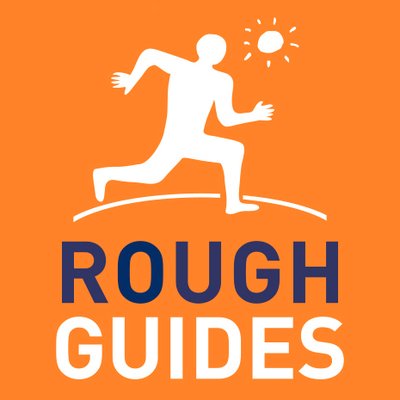Welcome to the world of the Vietnamese language, a language steeped in history, culture, and—yes, you guessed it—a bunch of tones that might initially have you scratching your head!
Now, we won’t sugarcoat it; Vietnamese is not the easiest language to learn, especially for Westerners. Its tonal nature can make it feel like you're learning to ride all over again. But don't worry, in this blog post we’ll teach you the difference between tones and equip you with 24 Vietnamese phrases for your next vacation to Vietnam!
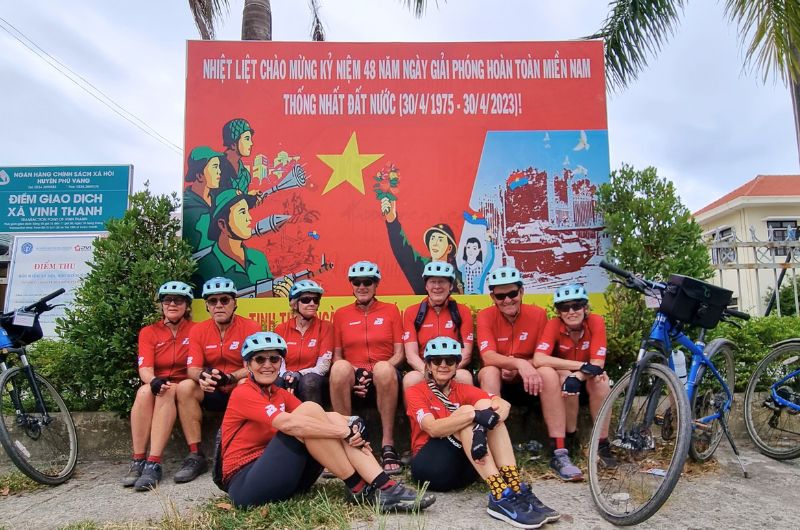
The Lowdown on the Vietnamese Language
Vietnamese, or "tiếng Việt," (tyang vyet) is the national and official language of Vietnam. It's the mother tongue of the Vietnamese people, who make up about 86% of Vietnam's population. The language also flourished beyond the Vietnam borders, with significant Vietnamese-speaking communities in the United States, Cambodia, France, and Australia.
The beauty of written Vietnamese lies in its simplicity: it uses the Latin alphabet, just like English! Adopted from French colonialists in the 17th century, the alphabet, labeled "quốc ngữ" (quok ngoo) or "national language," has been tweaked to suit Vietnamese phonetics. It now consists of 29 letters, with specific letters accorded to various Vietnamese sounds and tones.
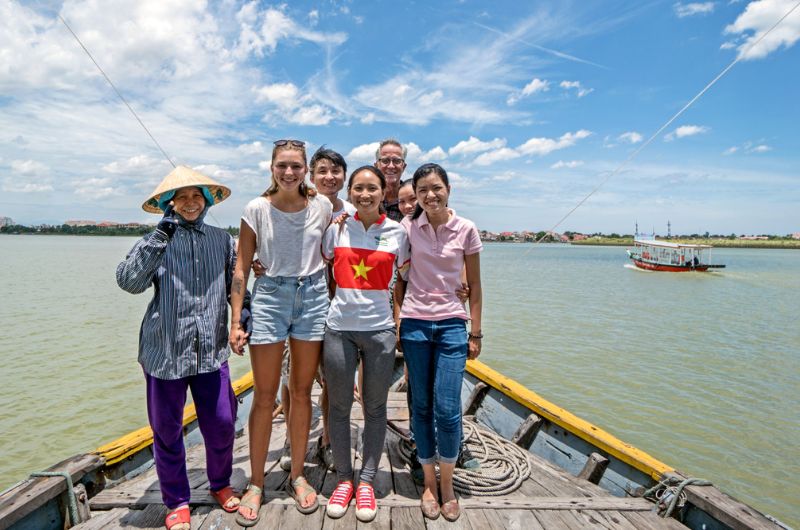
“But do I need to speak Vietnamese to visit Vietnam?”
In short, no. While it's true that many people in Vietnam, especially in prominent tourist hubs like Ho Chi Minh City, Hanoi, Da Nang, Nha Trang, Mui Ne, Hoi An, and Ninh Binh, are proficient in English, learning a few phrases may come in handy when you venture off the beaten path.
That being said, Vietnam is ranked in the top 10 foreign-friendliest countries. So, if you ever find yourself in a pickle, the Vietnamese's friendly nature and a little bit of sign language can go a long way.
Rest assured, if you book one of our guided cycling tours, our friendly local guides will have your back to bridge any language gap.
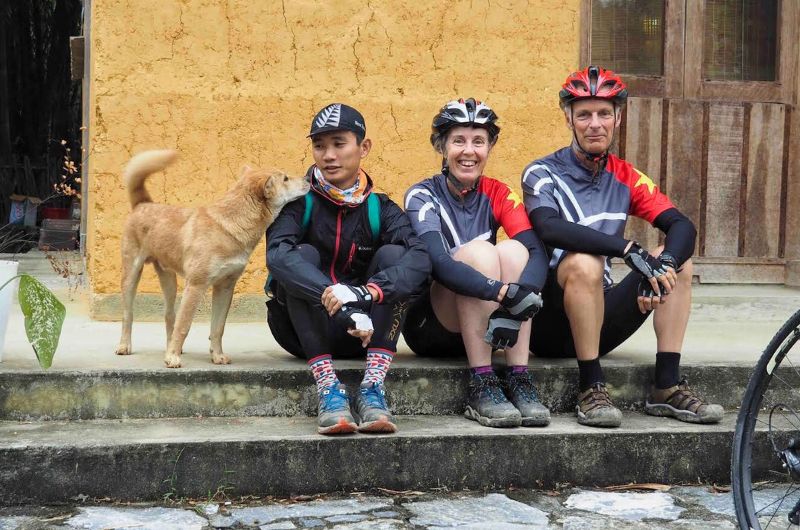
The Basics: Common Vietnamese Words and Phrases
1. Hello - Xin chào
Pronunciation: Zin chow
Greetings in Vietnam have a bit of flair! "Xin chào" is your all-around "Hello" for everyone. But, if you're greeting an older woman, go formal with "Chào Chị," meaning "Hello, Madame."
Let's talk greetings style. Men typically shake hands and give a little nod, while women do a polite bow with a nod. In rural spots, you might see a traditional bow with hands clasped above the waist. But in the city, the younger crowd usually keeps it modern with handshakes.
After mastering a polite 'Xin chào', be ready to greet smiling locals on your next adventure. Why not do it from the seat of your bicycle? Discover our multi-active biking tours of Vietnam here.
2. Thank you - Cảm Ơn
Pronunciation: Gam-um
3. Please - Vui Lòng
Pronunciation: Voo Laow
4. Excuse me
Xin Lỗi
Pronunciation: sin loy
Use this phrase if you accidentally bumped into someone or if you need to squeeze past them.
Em ơi
Pronunciation: em oy
This phrase, on the other hand, also means ‘excuse me’ but is used when you want to get someone's attention.
 5. Yes - Da
5. Yes - Da
Pronunciation: yah
6. No - Không
Pronunciation: comb
7. Nice to meet you - Rất vui được gặp bạn
Pronunciation: r-uht voo-yee d-uh-k g-uh-p ban
When you're introduced to someone new, this phrase can make a great first impression. Just keep in mind, in very formal situations, Vietnamese people prefer to use professional or familial titles rather than first names.
8. Goodbye - Tạm biệt
Pronunciation: Taam Byeet
A universal farewell phrase that works in all situations, whether you're saying goodbye to new friends or exiting a local coffee shop.
9. Beautiful - Đẹp
Pronunciation: dep
Master this phrase because you'll use it frequently on our Vietnam Self-Guided Ocean Road Bike Tour as you cycle the coastline of Vietnam. It's perfect not only for meeting locals and admiring landscapes, but also for expressing satisfaction with the discoveries you'll make, like unearthing a hidden beach or finding a perfect spot to watch the sunset.
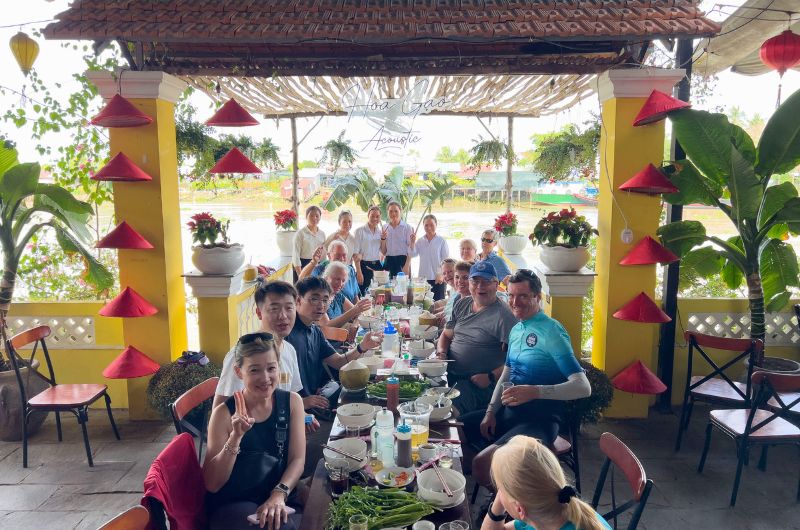
Food and Drinks: How to order and appreciate food in Vietnamese
10. An expression of gratitude spoken before the first bite - Chúc ngon miệng
Pronunciation: chuuk ngon meeyeng
This is the Vietnamese version of 'Bon Appétit' or 'Enjoy your meal'.
11. Delicious - Ngon
Pronunciation: ngon
12. Wine - Rượu
Pronunciation: ru-u
13. Beer - Bia
Pronunciation: bee-uh
14. Coffee - Cà phê
Pronunciation: cah-feh
The Vietnamese are famous for their unique coffee culture, so knowing a bit about how to order will definitely enhance your experience:
Black coffee: Cà phê đen (pronunciation: cah-feh den)
Coffee with milk: Cà phê sữa (pronunciation: cah-feh soo-uh)

In Vietnam, when ordering coffee, it's important to specify if you want it hot or iced as both are very popular:
Hot coffee: Cà phê nóng (pronunciation: cah-feh nong)
Iced coffee: Cà phê đá (pronunciation: cah-feh da)
And of course, a must try is Vietnam’s famous sweet and creamy egg coffee. This is how you'll ask for it:
Egg coffee: Cà phê trứng (pronunciation: cah-feh chung)
Savor the flavors of Vietnam, from a steaming hot cà phê to fresh local cuisine. Our Vietnam Essentials Bike Tour lets you experience these tastes firsthand in their native settings.
15. Water please - Cho tôi nước, vui lòng
Pronunciation: choh toy nook, voo-y lawng
16. Check, please - Tính tiền, vui lòng
Pronunciation: teen tien, voo-y lawng
17. I would like ___, please - Tôi muốn ___, vui lòng
Pronunciation: toy moo-un ___, voo-y lawng
18. 1, 2, 3, Cheers! - Một, Hai, Ba, Dzô!
Pronunciation: muht hi bah zoh
Just raise your glasses high and confidently shout, "Một, Hai, Ba, Dzô!". It's their fun way of saying, "One, Two, Three, Cheers!" Now, bottoms up!
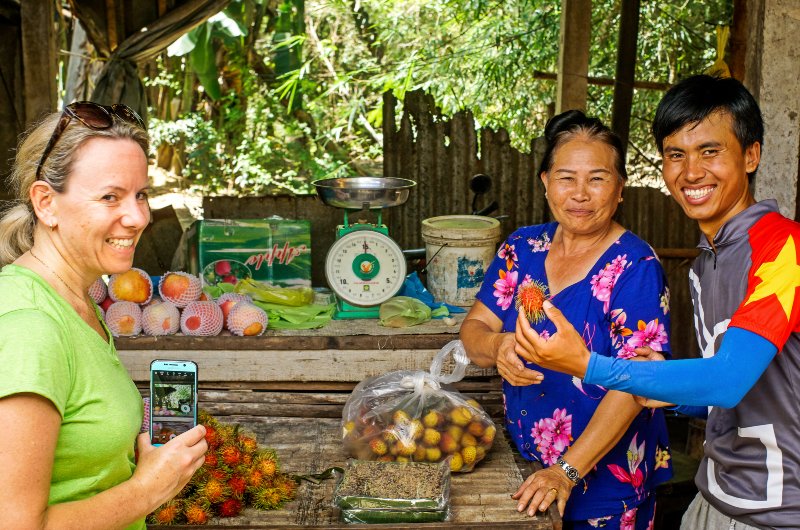
Useful Vietnamese Phrases to Use when Shopping
19. How much is this? - Cái này giá bao nhiêu?
Pronunciation: kai nay zah bow nee-yuh
20. I'll take it - Tôi sẽ lấy nó
Pronunciation: toy sae lay no
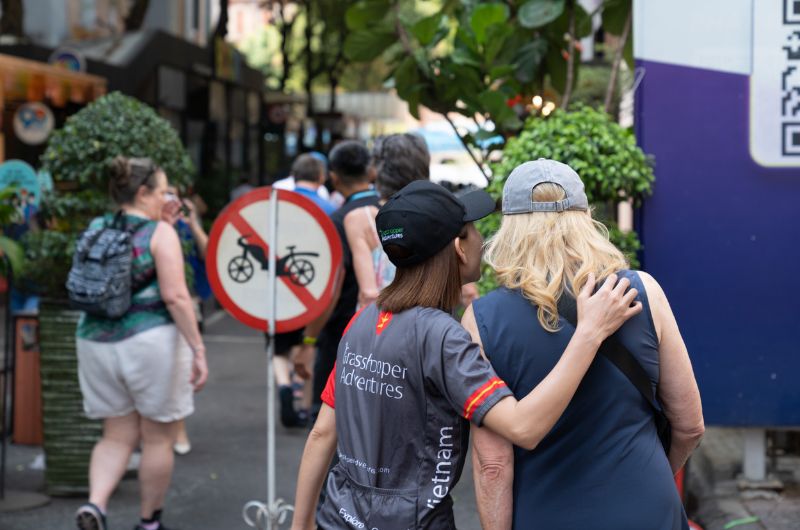
Emergencies and Assistance: How to Ask for Help in Vietnamese
21. Help! - Giúp tôi!
Pronunciation: zoop toy
22. Hospital - Bệnh viện
Pronunciation: ben vee-en
23. It hurts! - Tôi đau!
Pronunciation: toy dow
While we always hope for the best, we have your safety in mind. Our guides are always on hand to offer assistance in case of any emergencies. Join our thoughtful, well-planned Vietnam bike tours, suitable for all fitness levels.
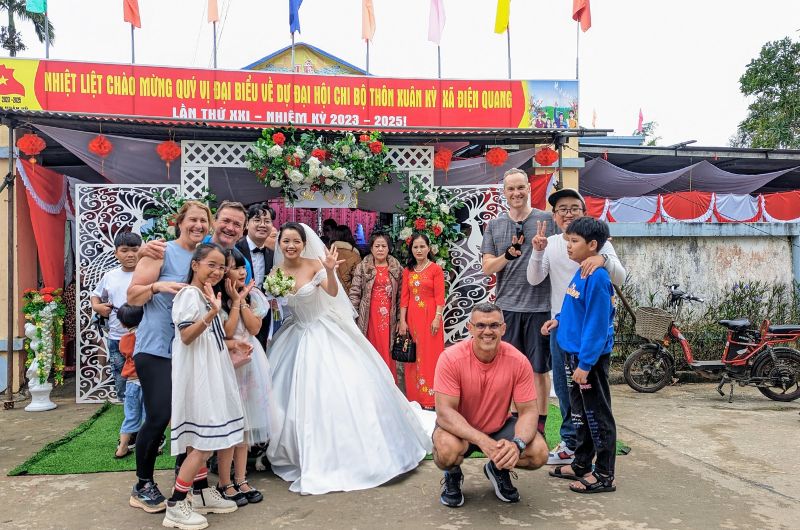
Last, But Certainly Not Least:
24. I love Vietnam! - Tôi yêu Việt Nam!
Pronunciation: toy ee-u vee-et nahm
You're guaranteed to warm the heart of your newfound connection with this phrase. So why not say 'Tôi yêu Việt Nam' as you bike, trek, and paddle through Vietnam's stunning landscapes. On this tour, you won't just see Vietnam; you'll feel it, touch it, and live it.
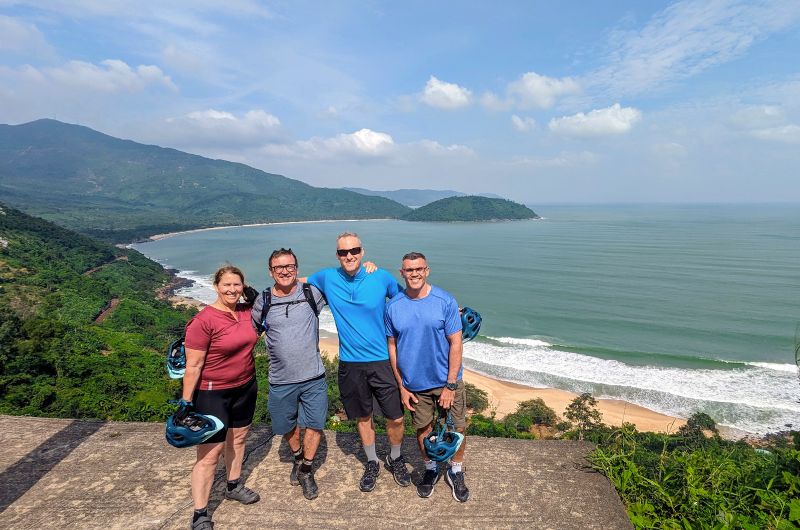
Striking the Right Tone: Vietnamese Tones Explained
Just as music has seven notes, Vietnamese has its own range of tones—six to be exact. Each syllable in Vietnamese is pronounced with one of these six tones, which changes the meaning of the word entirely.
Take a look at the word "ma" for example. Depending on the tone, "ma" can mean ghost, mother, rice seedling, tomb, or horse.
That's right; not only do you need to watch how you pronounce a word, but also how your voice rises and falls when saying it.
- Ngang tone: (No accent) Your voice stays flat and even, much like when you're reading aloud from a textbook.
- Huyền tone: (Accent: `) Your voice starts normal but then goes down slightly, as if you're a bit tired or sad.
- Sắc tone: (Accent: ´) It's the opposite of Huyền. You start with your normal voice but end on a higher note, like when you're happily surprised.
- Nặng tone: (Accent: ạ) It's like you're telling a secret—you start at a normal level, then drop your voice down low and abrupt.
- Hỏi tone: (Accent: ?) For this tone, you drop your voice and then bring it back up again, as if you're asking a question.
- Ngã tone: (Accent: ~) It's like the Hỏi tone, but with a bit more of an action. You drop your voice, bring it up, and then let it fall again.
Conquering those tones might seem like quite a task, but every belly laugh shared over a mispronunciation breaks the ice and unearths Vietnam's authentic hospitality. After a few attempts, you should get a feel for the sound, and pronunciation gets easier.
So, whether you're still contemplating venturing into the depths of Vietnam or you've already dipped your toes in the 'phở' pot, take a deep breath and let’s dive right in.
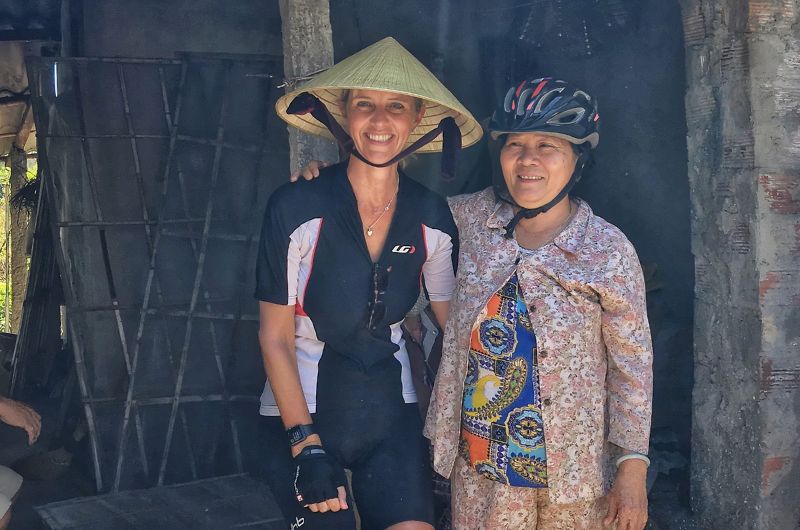
Overcoming Language Hurdles to Unveil Unforgettable Adventures
Well, that's a wrap! Brace yourself to be enticed, energized, and entirely enchanted by the vibrant hues and rhythmic pulse of Vietnam. Imagine breathing in the scents of steaming Pho, pedaling through lush rice terraces, and sharing laughter with friendly local guides fluent in bridging language gaps.
All this and more is just a click away with our meticulously planned cycling tours! Step out of the crowd, leap into an adventure, and live the Vietnamese tale that's waiting to be yours.
 By Lirene Cilliers Posted 6th Feb 2024
By Lirene Cilliers Posted 6th Feb 2024







